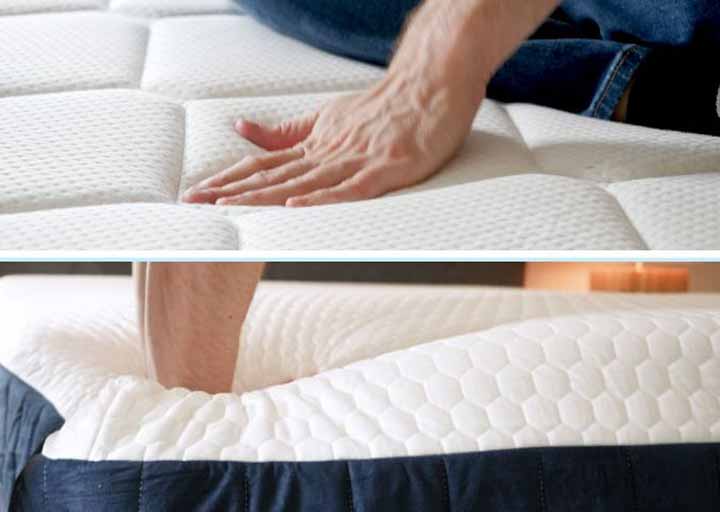In the quest for an ideal night’s sleep, the mattress often emerges as the unsung hero—or villain, depending on its traits. While societal norms might dictate that a softer mattress translates to heightened comfort, the reality is that subjective experiences of sleep can vary dramatically. As you delve into the world of sleep comfort, it’s imperative to ponder: Can a bed be too soft for you?
The efficacy of a mattress hinges not solely on its exposed softness or firmness; rather, it intertwines with individual physiological needs, preferences, and sleep patterns. Understanding the nuanced relationship between mattress comfort and personal health can foster a transformative perspective on sleep quality, guiding you toward the ideal nighttime haven.
First, let’s consider the anatomy of a mattress and its various construction elements. The materials used—be it memory foam, latex, or traditional innerspring—play a pivotal role in how a bed feels. Memory foam mattresses, for instance, are renowned for their ability to contour to the sleeper’s body, providing a cocooning effect that can be seductive. However, this allure can mask potential pitfalls. A mattress that is too soft might induce excessive sinkage, resulting in spinal misalignment.
Spinal alignment is essential for a beneficial sleeping posture. When the spine is neglected, the repercussions can be quite severe. For people who switch positions throughout the night, the need for support becomes even more critical. A mattress offering insufficient firmness under the hips and shoulders can leave you waking up with aches and pains. So, while the initial embrace of a plush surface might seem divine, it could lead to a less-than-desirable awakening.
Another factor to contemplate is body weight, which can dramatically influence how a mattress feels. Heavier individuals might find themselves sinking deeper into a soft mattress, thus exacerbating issues related to support and alignment. Conversely, lighter sleepers may thrive on the plushness, enjoying its ability to cradle their bodies. This disparity unveils a crucial tenet: there’s no one-size-fits-all in the realm of sleep comfort. Understanding your unique body dynamics can illuminate a more tailored approach to mattress selection.
Moreover, one cannot overlook the significance of sleeping position. Side sleepers, for example, often benefit from a softer mattress that alleviates pressure on the shoulders and hips. On the other end of the spectrum, back and stomach sleepers may find themselves trapped in a soft abyss—leading to inadequate spinal support. This taxonomy of sleep positions underscores the idea that a bed’s softness is not an absolute good; instead, it is profoundly relative and ought to be evaluated through the lens of personal habit and style.
Temperature regulation also merits consideration when it comes to mattress choice. Softer materials are often more heat-retentive, which can lead to an uncomfortably warm sleeping environment. For those prone to overheating at night, a mattress that allows for airflow and a cooler sleep surface is paramount. Hot sleepers might discover that a firmer mattress, with its tendency to resist sinkage and promote airflow, provides a more restorative sleeping experience. The interplay between mattress softness and thermal dynamics adds yet another layer of complexity to the pursuit of sleep nirvana.
However, everything comes with a consideration of personal preference. What one individual deems overly soft could be viewed as heavenly by another. The subjective nature of comfort means that the solution lies in engaging with the various layers of a mattress until you find your personal sweet spot. Many mattresses come with trial periods to encourage you to assess how well you acclimate to a particular level of softness or firmness. This practice can be invaluable, allowing you to shift your perspective on what truly constitutes comfort.
If you find that your mattress is indeed too soft for your liking, what recourse do you have? There is no need to despair; replacements or adjustments are within reach. Introducing a mattress topper—a product that enhances comfort without the commitment of a full replacement—can yield impressive results. By choosing a firmer topper, you can achieve a harmonious balance that supports your sleeping habits.
It’s also worth exploring other ways to mitigate the potential downsides of a too-soft mattress without a daunting overhaul. Strategic pillow placement can aid in maintaining alignment, while adjusting your sleeping position may alleviate some pressure points. Regular rotation of the mattress can distribute wear and prolong its longevity, ensuring that a too-soft bed does not become an irreversible lament.
In conclusion, the inquiry into whether a bed can be too soft hinges on several variables: individual anatomy, sleep style, temperature regulation, and even personal preference. The adventure toward discovering the right mattress for your unique needs can lead to profound shifts in how you perceive comfort and quality of sleep. Ultimately, what you deem ‘soft’ may very well be the softest embrace you could ever hope for—or, conversely, a plush trap that leaves you yearning for rejuvenation. Embrace this exploration, and approach your sleeping environment with curiosity. You might just discover the perfect balance that leads to a sublimely restorative night’s sleep.
